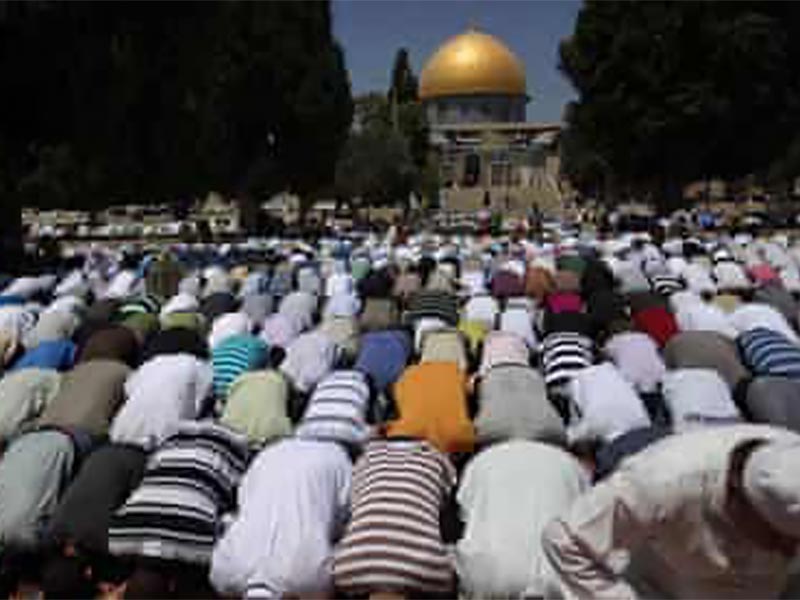Ramadan is the holiest month in the Islamic calendar. During this month, Muslims abstain from eating and drinking from dawn until sunset. When the sun goes down, it is common for Muslims to break the fast with something sweet, like a date, to satisfy their hunger before taking time for prayer. Afterwards, friends and families will gather together for a large meal, Iftar, which consists of traditional foods unique to one’s family and culture. Like many other aspects of our lives, however, COVID has impacted this important Islamic occasion. Early on, families were deterred by closures and curfew that affected how Ramadan was observed, while in 2021 questions have arisen about whether the vaccination is allowed during the month.
Fasting is one of the five pillars of Islam (the others are the declaration of faith, prayer, pilgrimage to Mecca, and charity), and it is therefore obligatory for almost every healthy adult. Children and adults with illnesses are exempted from the obligation, as are travelers, pregnant women, and breastfeeding mothers. However, many children and exempted adults choose to fast anyway, in order to join in their communities’ rituals.
When is Ramadan?
Ramadan is the ninth month of the Islamic calendar. Because the Islamic calendar is lunar, the timing of Ramadan shifts on the Gregorian calendar.
The start of Ramadan is determined by the sighting of the new moon. Some Muslims believe that the new moon must be sighted in a particular locale for Ramadan to begin there. Others believe that Ramadan begins for all Muslims when the new moon is sighted in Saudi Arabia. In 2021, Ramadan begins on April 21st.
Why do Muslims fast during Ramadan?
Muslims fast during Ramadan to commemorate the revelation of the Quran to the Prophet Mohammed, which is believed to have taken place during this month.
According to scholar John Esposito, the discipline of the Ramadan fast is intended to stimulate reflection on human frailty and dependence upon God, focus on spiritual goals and values, and identification with and response to the less fortunate.
Is fasting the only way Muslims celebrate Ramadan?
Ramadan is also a special time of year in which all good deeds are highly encouraged. In addition to fasting, many Muslims practice extra night prayers, called taraweeh. Many go to the mosque for the evening prayer, followed by special prayers recited only during Ramadan. Some will recite the entire Quran (one-thirtieth each night of the month) as a special act of piety, and public recitations of the Quran or Sufi chanting can be heard throughout the evening. Families rise before sunrise to take their first meal of the day, which must sustain them until sunset (Esposito, 2002).
The last ten nights of Ramadan are especially important. It is believed that lailut al-qadr, the night of power, will take place on one of those nights. The night of power is described in the Quran as being “better than a thousand months.” Therefore, it is believed that any good done on that night are particularly virtuous. Many Muslims will spend one or more of the last ten nights in itikaaf, sustained devotion, usually overnight, in the masjid.
The month of Ramadan ends with one of the two major Islamic celebrations, the Feast of the Breaking of the Fast, called Eid al-Fitr, which resembles Christmas in its spirit of joyfulness, special celebrations, and gift giving (Esposito).
Additional Information
IHOP And Ramadan: A Uniquely American-Muslim Tradition
Early morning trips to IHOP are integral to many American Muslims’ Ramadan experience. There, they share the crowded diners with partiers on their way home.
America’s First Ramadan Break-Fast Was Hosted by Thomas Jefferson
In 1805, Sidi Soliman Mellimelli arrived in the United States from Tunisia. He was the first Muslim envoy to come to the new country. During his visit, he celebrated Ramadan, and President Jefferson hosted an iftar for him.
Black Ramadan and the Importance of Finding Community in Isolation
Shamira Ibrahim’s poignant personal essay contrasts her mother’s stories of growing up in Comoros, experiencing Ramadan as part of a joyful community, with her own more solitary experience of fasting. Ibrahim does not enjoy continuously re explaining her fast to her friends and coworkers, which is all the more necessary because she does not fit society’s understanding of what a Muslim should look like.
Muslim inmates successfully sue Michigan for starving them during Ramadan
The Michigan Department of Corrections failed to give four Muslim inmates the legally mandated 2,600 calories after sunset and before dawn during Ramadan. Some days, they received as little as 1,000 calories. Effectively, the state forced them to choose between starving or disobeying the religious edict to fast, in violation of the first and eighth amendments.
In Southern India, The Spirit Of Ramadan Is Served In A Bowl Of Porridge
Ramadan is not only about fasting. Many in Southern India honor the holy month through a renewed commitment to charity, in particular, to giving out filling porridge and other foodstuffs to those who cannot afford to purchase them.


